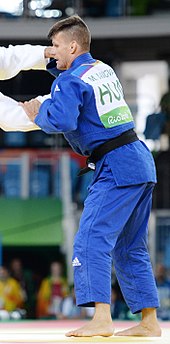Miklós Ungvári
Miklós Ungvári (born October 15, 1980 in Cegléd ) is a Hungarian judoka . He was three times European champion in half light weight (up to 66 kg).
Athletic career
Ungvári was Hungarian cadet master three times in a row from 1995 to 1997 in weight classes under 50 kg. From 2000 to 2012 he was mainly active in the half-light weight category, then mostly in the light weight category (up to 73 kg). In 2001 he won his first of seven Hungarian championship titles: 2001, 2002, 2003, and 2007 he won the lightweight division, 2006, 2010 and 2013 he was successful in the lightweight division.
In 2002 Ungvari won his first World Cup tournament in Warsaw. At the European Championships in Maribor in 2002, he won the final against the Slovak Jozef Krnáč . The following year he finished seventh. At the 2004 Olympic Games , he was eliminated in his second fight against the Portuguese João Pina . At the end of 2004 Ungvári won the student world championships and was second with the Hungarian team. In 2005 he reached the final at the European Championships, but then lost to the Azerbaijani Elchin Ismayilov . At the 2005 World Championships in Cairo, Ungvári was defeated early against the eventual world champion João Derly from Brazil, but then won four fights in the hoping round and received a bronze medal. At the European Team Championships in 2005 the Hungarians took second place. In 2006, Ungvári finished second at the World Student Championships. In 2007 he reached fifth place at the European Championships. At the 2007 World Championships in Rio de Janeiro he was defeated in the quarter-finals against the Cuban Yordanis Arencibia , after three wins in the round of hope he received the bronze medal, like two years before. In 2008 Ungvári reached the final at the European Championships in Lisbon , where he was defeated by the Georgian Sasa Kedelashvili . At the 2008 Olympic Games he defeated Kedelashvili in the second round, but lost in his third fight against the Russian Alim Gadanow .
The European Championships in 2009 took place in Tbilisi, Ungvári defeated the Russian Gadanow in the semifinals, and in the final he won against Tomasz Kowalski from Poland . At the World Championships in Rotterdam he was defeated in the semifinals against the Spaniard Sugoi Uriarte , but then won the battle for bronze against the Romanian Dan Fasie . In 2009 the Hungarians won the European Team Championships. 2010 at the European Championships in Vienna Ungvári lost in the final against the Spaniard Uriarte. At the 2010 World Championships , he reached seventh place. After 2002 and 2009 Ungvári won his third European title in Istanbul in 2011 by beating Tərlan Kərimov from Azerbaijan in the final . The following year he was defeated at the European Championships in Chelyabinsk in the semifinals against Alim Gadanow and then lost the fight for the bronze medal against the Slovenian Rok Draksić . At the Olympic Games in London he won the semifinals against Sugoi Uriarte, in the final he was defeated by Georgian Lascha Schawdatuaschwili .
After his promotion to lightweight, he won bronze at the European Championships in Montpellier in 2014 after losing to Dutchman Dex Elmont in the semifinals . In 2015, he finished seventh both at the European Championships held in Baku as part of the European Games and at the World Championships in Astana . In his fourth Olympic participation in 2016 in Rio de Janeiro, he was defeated in the quarter-finals against Rustam Orujov from Azerbaijan, while the Belgian Dirk Van Tichelt won the battle for bronze . Ungvári also took fifth place at the 2017 European Championships in Warsaw .
Web links
- Miklós Ungvári at JudoInside.com
- Miklós Ungvári in the Sports-Reference database (English; archived from the original )
| personal data | |
|---|---|
| SURNAME | Ungvári, Miklós |
| BRIEF DESCRIPTION | Hungarian judoka |
| DATE OF BIRTH | October 15, 1980 |
| PLACE OF BIRTH | Cegléd |
